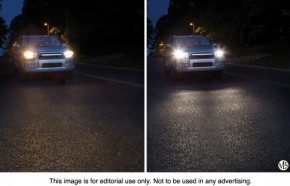The dangers of driving with old headlights
(MS) — Routine vehicle maintenance protects drivers and their passengers and can keep cars and trucks running strong for years. Though drivers typically recognize the need to have their oil changed and their tires rotated, few may realize the importance of tending to their headlights as well.Why replace aging headlights?
Much like tires, shocks and brakes, headlight bulbs wear out over time. As bulbs age, they begin to dim, adversely affecting their light output.
“The filament in a headlight bulb ages with use, time and exposure to the elements,” said Ann-Marie Hines, Senior Marketing Manager at Lumileds, a global lighting solutions company. “As a result, the bulb becomes fragile and starts to deteriorate, and this causes the light output to diminish. At the end of a typical service life, perhaps two to three years, headlight bulbs will likely be projecting a much shorter and less powerful beam light than when they were new.”
Aging drivers are especially vulnerable to the ill effects of headlights with diminished light output. That’s because the amount of light the human eye needs to see increases exponentially with age. As a person ages, his or her eyes naturally become more opaque, reducing the amount of light the eyes can receive. That’s a significant concern for aging drivers, but also for the people with whom they share the road, as the National Highway Traffic Safety Administration estimates there will be more than 57 million licensed drivers age 65 and older by 2030. Taking measures to have as much light as possible on the road when driving at night can go a long way toward ensuring the safety of all motorists.
How to put more light on the road
While drivers may not be able prevent the effects of aging on their eyes, they can take steps to put more light on the road when they’re driving.
• Replace old headlight bulbs. Replacing old headlight bulbs is the simplest way for drivers to put more light on the road. Lumileds recommends replacing headlight bulbs in pairs every two to three years. Replacing bulbs in pairs, even if only one headlight appears to be dimming, can produce a more even light output that makes roads safer for drivers, their passengers and fellow motorists.
• Upgrade headlight bulbs. Merely replacing aging headlight bulbs might not be enough to adequately combat the effects of aging for many drivers. That’s because a recent study from the AAA automotive club found that the halogen headlights used in more than 80 percent of the vehicles on the road today failed to safely illuminate unlit roadways, even when vehicles were traveling at speeds as low as 40 miles per hour. Lumileds, the exclusive supplier of Philips automotive light products, offers a full range of Philips upgrade headlight bulbs that can help to dramatically improve nighttime vision and safety. These bulbs feature advanced technology that makes them brighter and more efficient, which puts more light on the road. Lumileds also has developed an innovative and convenient online Bulb Look Up that helps drivers identify the right headlight, exterior or interior bulb for their particular vehicles. The Philips
Bulb Look Up, available at
www.philipsautolighting.com, even shows drivers where they can buy the right bulbs for their vehicles.
• Keep headlights clean. Dirty or clouded headlight lenses can also reduce light output and further compromise drivers’ visibility at night. Periodically clean headlights to remove any build up of dirt or grime. If the lenses are clouded or have a yellow haze, the clarity can be restored to ‘like new’ condition with the Philips Headlight Restoration Kit.
When combined with the natural effects of aging, old headlights can be dangerous. Thankfully, drivers can quickly and easily improve their vehicles’ light output to make nighttime driving safer. Learn more at www.philipsautolighting.com. SC183863


